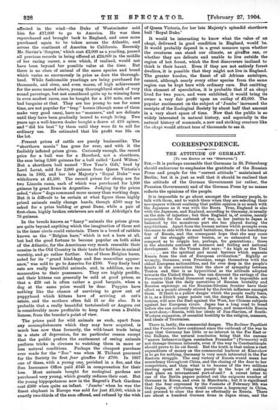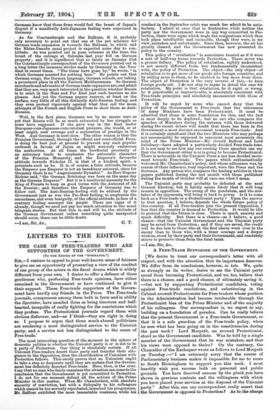THE ATTITUDE OF GERMANY.
[To THE EDITOR OP THE "SPECTATOR."' SIR,—It is perhaps excusable that Germans in St. Petersburg should endeavour to emphasise the gratitude of the Russian Press and people for the "correct attitude" maintained at Berlin; but it is just as well that it should be realised that the attitude of the German Government (or rather, the Prussian Government) and of the German Press by no means reflects the opinions of the people.
It is impossible to go about amongst the ordinary people, to talk with them, and to watch them when they are selecting their newspapers without realising that public opinion is as much with the Japanese as it was with the Boers. True, England is also with the Japanese, and England, according to Germany, is usually on the side of injustice ; but then England is, of course, mainly responsible for the outbreak of war, so her justice to Japan is balanced by the monstrous part she has played during the negotiations. Apart from the human nature which prompts even Germans to side with the small battalions, there is the hereditary fear of Russia, and the consequent hope that she may come out of the struggle either beaten, or so exhausted by her conquest as to cripple her, perhaps, for generations ; there is the absolute contrast of manners and feeling and national development. So the Vienna Zeit says : "As high as the Ural are the spiritual and moral barriers which separate Russia from the rest of European civilisation." Rightly or wrongly, Germans, even Prussians, range themselves with the oldest European nationalities, and for ever deep in the people's hearts is the conviction that the show of sympathy between Teuton and Slav is as hypocritical as the attitude adopted towards the United States. One can discount the ravings of the Vorwaerts (the Social Democrat organ), but it is impossible not to realise that the daily narratives of Russian brutality and Russian espionage on the Russian-Silesian frontier have their effect on a people already stirred by the Jewish influence amongst them. If there is a yellow danger which the people really fears, it is, as a Zurich paper points out, the danger that Russia, vic- torious, will arm the East against the West, her Chinese subjects against her European rivals. Japan has a long road to tread before she can seriously threaten Europe, and meanwhile Russia is next-door,—Russia, with her ideals of Pan-Slavism, of South- Western expansion, of essential hostility to the religion, manners, and ideals of Teutonism.
There is, lastly, the commercial danger. The Berliner Tagelgatt and the Vossische have continued since the outbreak of the war to urge that Germany has little or no interest in the Far East or the Balkans, the natural conclusion being that the success " unsres liebenswardigen russischen Freundes" (Vermeils) will not damage German interests, even if the way to Constantinople should prove to lie via Seoul. But the truth is that unless a vast expenditure of money on the commercial harbour at Kiao-chow is to go for nothing, Germany is very much interested in the Far Eastern struggle. The easy victory of Russia would mean her ascendency throughout China, and the closing of the door to her competitors, and then what is to become of the two millions sterling spent at Tsing-tao purely in the hope of making that place an international port-of-call ? A recent letter to one of the Berlin papers pointed out the exiguous number of Germans in Korea, and even in Manchuria ; but it is significant that the fear expressed by the Vossisehe of February 9th was that Japan, if victorious, would exercise a hegemony in China, and proceed to close the door as effectually as Russia. There are about a hundred German firms in Japan alone, and the Germans know that these firms would feel the brunt of Japan's disgust if a manifestly Anti-Japanese feeling were expressed in Germany.
. As for Constantinople and the Balkans, it is probably only necessary to point out that one of the pet schemes for German trade expansion is towards the Balkans, to which end • the Rhine-Danube canal project is expected some day to con- tribute. As was pointed out in your columns at the time, the brunt of the outrage at Salonika last year fell on German property ; and it is significant that so lately as January 21st the Constantinople correspondent of the Germania pointed out in
• a long letter the immense strides made by Germany in the Near East in recent times. "The times have gone by," he wrote, "in which Germans counted for nothing here." He points out that German songs, the German language, German schools, are taking a prominent place in all the Eastern Mediterranean. So German merchants and advocates of German trade expansion are, and admit that they are, very much interested in the question whether Russia is to erect in the Near and Far East just such barriers as she pleases. And yet the German papers express, at least on the surface, very little of all this distinctly Anti-Russian feeling, and
• they even protest vigorously against what they call the mean attempts of the French and English Press to show them as Anti. Russian.
Well, in the first place, Germans are by no means sure as yet that Russia will be as much exhausted by her struggle as some have supposed. If she gave way in the East under European-cum-Japanese-cum-internal pressure, she would, or at least might, seek revenge and a restoration of prestige in the West. And Germany is next-door. The other reason is that the Prussian Government, through the official and semi-official Press. is doing its best just at present to prevent any such popular outburst in favour of Japan as might seriously embarrass the authorities. At all times the territorial proximity of an autocracy tends to emphasise the autocratic character of the Prussian Monarchy, and the Emperor's favourite attitude towards Nicholas II. is that of a kindred spirit, a potentate such as he. It is, of course, a false attitude, because the Emperor qua Emperor is not an hereditary autocrat, since for Germany there is no " Angestammte Dynastie." As Herr Eugene Richter said, "the German Reichstag was born on the same day as the German Emperor." But it is a territorial necessity for the King of Prussia to keep on good terms with the Autocrat of All the Russias ; and therefore the Emperor of Germany has to follow suit. The Anti-Russian feeling will be utilised by the Government just as was the Pro-Boer feeling, to emphasise the correctness, and even benignity, of the official attitude, in face of a contrary feeling amongst the people. There are signs of it already, though we need not pay too much attention to the usual telegram stories. But that this is, and will be, the attitude of the German Government unless something quite unexpected should occur, there can be little doubt.
i i











































 Previous page
Previous page